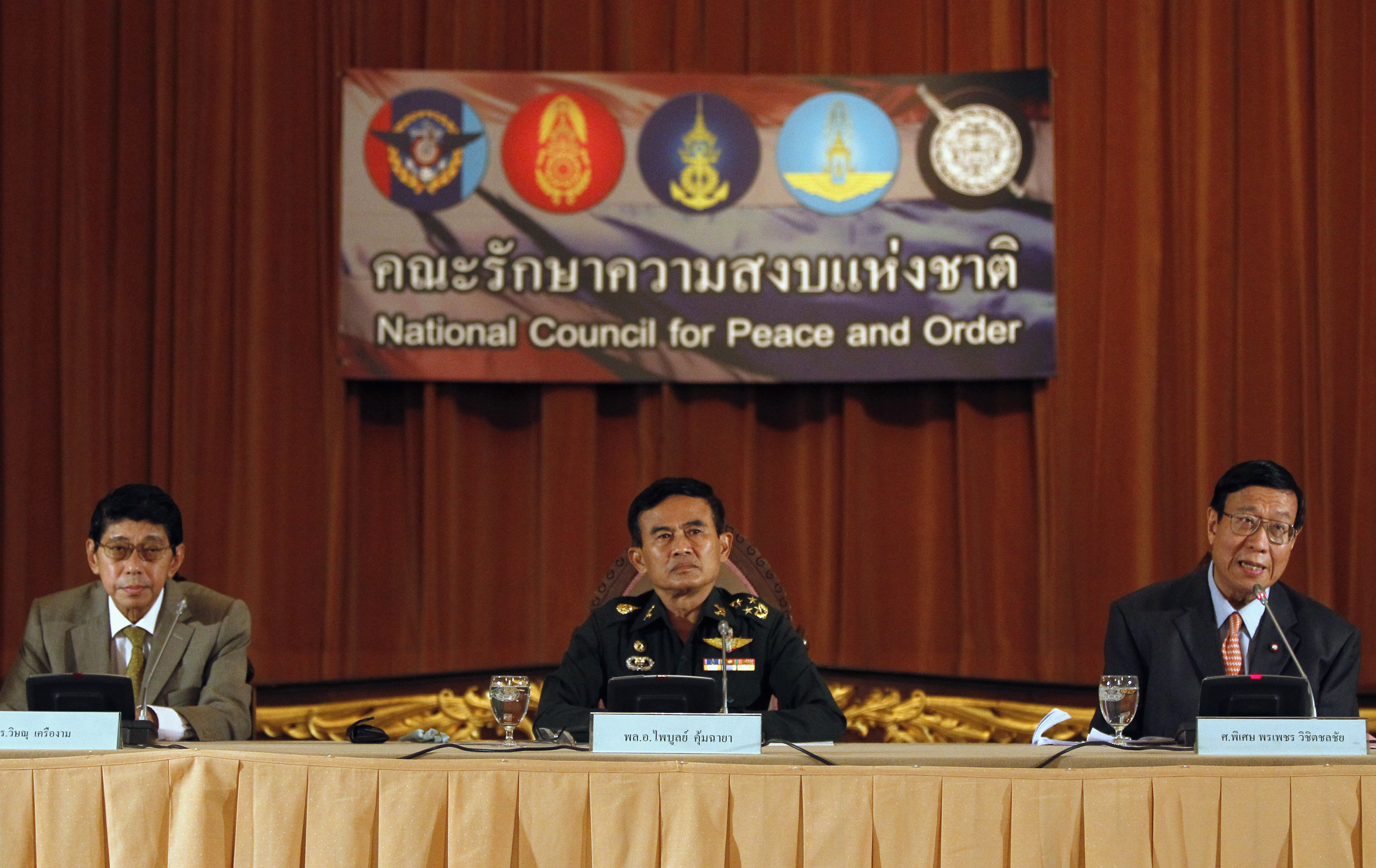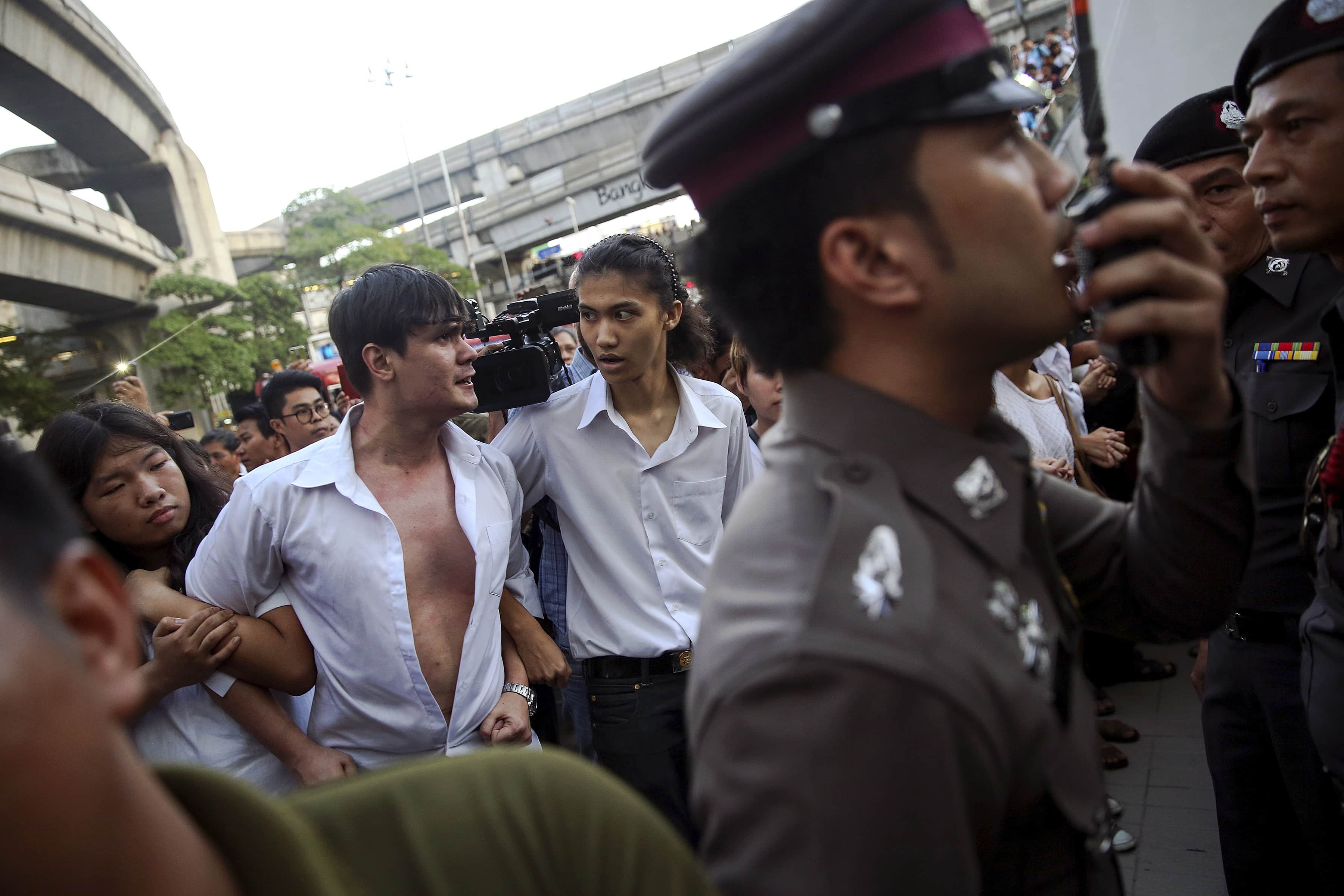One year later, the general political atmosphere in Thailand has been one of suppression of persons and groups opposed to the May 2014 coup.
This statement was originally published on seapa.org on 25 May 2015.
It has been a year since the 22 May 2014 military coup in Thailand and the prognosis is far from certain as to whether the political, social and legal reforms will work, considering the general absence of public consultation and democratic processes.
Press freedom and the public exercise of freedom of expression have taken a severe beating within the framework of the so-called reforms aimed at introducing more regulations with severe crackdowns in the interim, instead of instituting more openness, inclusiveness transparency and accountability.
The report of the Southeast Asian Press Alliance (SEAPA) on World Press Freedom Day 2015, named Thailand as one of the three Southeast Asian countries – along with Malaysia and Myanmar – that saw the situation worsen from the previous year. In particular, the series of orders introduced by the junta, named National Council for Peace and Order (NCPO), only led to the consolidation of the power holders and to the weakening of citizens’ political participation. [Read SEAPA’s 2015 country report on press freedom in Thailand]
Despite the nominal lifting of martial law on 1 April this year, its Orders No. 97 and No. 103 (2014) and Order No. 3 (2015) remain in place to restrain not only free speech but also the conduct of journalism. Journalists who write critically about the NCPO’s domestic and foreign policy issues as well as the process of drafting the new constitution have constantly been at the end of rather outrageous reactions by the NCPO chief and Prime Minister, Gen Prayut Chan-ocha. Even the coverage of what is now a regional crisis involving the Rohingyas is being curtailed by the authorities. For example, authorities have barred reporters from boarding patrol boats deployed to intercept refugee-carrying boats in order to interview them.
The general political atmosphere in Thailand has been one of suppression of persons and groups opposed to the coup. According to a 21 May report of the Thai freedom of expression documentation center iLaw, as many as 751 people including journalists and editors have been summoned by the military for “attitude adjustment” during the year. Of this number, 428 were detained in relation not only to suspected involvement in violent incidents, but also for expressing their political beliefs in public. There are at least 68 political prisoners, and at least 34 convictions related to lese majeste. Over 100 persons have been tried in military courts and 46 in civilian courts for defying martial law orders.
The range of charges including lese majeste accusations can also be seen as a clean up of opponents either in politics or in the bureaucracy, and to keep the lid on any attempts at political mobilisation. Marking the first year anniversary has been noteworthy for the absence of large organised demonstrations and a sustained movement. Instead, smaller pockets of citizens’ resistance have been sporadic, like Friday’s student protests, who were also hauled up for public gathering in Bangkok over the weekend.
Repressive actions include orders to refrain from conducting media briefings on politics and human rights. For example, a foreign foundation’s planned release in late January of the Asian Media Barometer for Thailand that analysed the performance of the media was cancelled at the last minute as after it was given the thumbs down by the NCPO.
The international community has expressed concerns at the downward spiral of the overall environment for the exercise of freedom of expression and press freedom, which they said would prevent meaningful political solutions to the crisis.
Broadcast media censor
The exercise of the junta’s power through the National Broadcasting and Telecommunications Commission (NBTC) to shut down pro-Redshirt satellite television Peace TV in April has been criticised as not following due process. Moreover, NBTC’s order effectively shed its independent nature as a regulatory body, whose initial overarching objective was to end state and military control over the broadcast media.
Prior to the coup, the NBTC has been criticised for lacking transparency and expertise in various decisions related to frequency allocation and supervision of broadcast operation management and content. It was also accused of being prone to interventions from powerful politicians and businessmen. Among the strongest criticisms it received was for its failure to regulate unruly the community radio and satellite television landscapes.
At the same time, the role of NBTC in regulating and policing the broadcast content was contested by professional groups as infringing upon media freedom. At issue is the NBTC’s proposed regulation to implement Article 37 of the 2008 Broadcasting Act which will empower the body to notify broadcasters and suspend their licenses for carrying ‘inappropriate content’ such as those threatening national security and public morals). Because of this, a public debate ensued on whether the NBTC should have a power to censor or remove broadcast content. Media professional groups preferred a co-regulation model in which NBTC may receive public complaints and forward them to related professional organizations to investigate and consider remedies for aggrieved parties. On the other hand, some consumer groups wanted the NBTC to have power to axe “poisonous” television content.
This unfortunate circumstance sets the stage for the army to intervene, with the apparent consent of the public. Similar to the Peace TV licence cancellation, provincial media groups were reportedly satisfied that the military-sanctioned decision of the NBTC to withhold thousands of licenses of community radios, which were regarded as mouthpieces of political parties. It became a reason to disrupt the operations of all community radio stations immediately after the coup.
The concern is that no matter how much the laws guarantee the independence of the NBTC, the military would always be able to overrule those decisions.
Moving away from self-regulation
After almost two decades of working towards self-regulation in the media sector, the NCPO and its reform machinery appear to be moving toward over regulation. The media driven model of keeping itself in check may be the biggest loss in this military-led juggling of political interests. The critical mass that voiced its common aspiration during the May 1993 democracy uprising to end state and military monopoly of the broadcast media is sadly quiet today.
Over the past years though, the self-regulatory model has not proven to be effective in raising professional and ethic standards of Thailand’s fast-growing and complex media landscape. It is not equipped with legal power to enforce compliance with media organizations or workers that violate media professional ethics.
The Press Council of Thailand and professional media and advocacy groups such as the Thai Journalists Association and the Thai Broadcast Journalists Association whose structure and organizational history are designed to regulate mainly legacy media have also been questioned by the public for being partisan and for lacking teeth in punishing unethical media outlets. They have also been criticized for their silence when it comes to the protection of online news media and individual political expression.
Presently, media reform is being discussed as part of the national reform agenda of the military-installed National Reform Council (NRC). The decision of media stakeholders and professional organizations to engage and participate in the NRC process has been roundly criticized by some sectors for legitimizing the military coup. The former argued that it would have been more harmful to for media freedom and independence if the process were to proceed without their participation.
The draft of Thailand’s next constitution has retained the same guarantees on media freedom from the 2007 Charter. However, controversy has emerged over a proposal to regulate the media through a new non-state regulatory body with legal powers to protect media professionalism and ethics.
A key point of contention among the media community about the proposal is whether the new body would add another layer of control over the media. In addition, the proposal would open up issues of defining who is considered as “professional” media under the new body’s mandate.
On a positive note, another new element in the current draft constitution is the regulation of state advertising and business investment in the media sector to prevent their interference in the media’s editorial independence.
Outside constitutional proposals, the future of online expression is at stake under the draft digital economy bills. This proposed set of 10 laws reinforces the already repressive Computer Crimes Act of 2007 since it will give the state security apparatus more centralised power to police, block and take legal actions against any content deemed as a threat to national security.
The “one step forward two steps back” situation in Thailand reflects a prevailing pattern in the region towards increasing controls over the media.
A stronger push back from civil society to ensure that fundamental freedoms are protected, laws meet international standards and oversight mechanisms are fair, are among the indicators of whether reforms will indeed be meaningful in Thailand. For now, an accepted consensus is that more time will be needed for reforms to take root and grow; but if the framework of freedom of expression and media freedom is not right, then new fault lines may emerge.

Thailand’s Deputy National Council for Peace and Order (NCPO) chief General Paiboon Koomchaya (C), NCPO legal adviser Wissanu Krea-ngam (L) and Pornphet Vichitcholchai, Chief Counsel of the National Peace Keeping Council, attend a news conference on the details of the interim charter, at the Government House in Bangkok, 23 July 2014REUTERS/Chaiwat Subprasom



